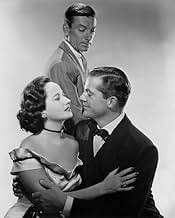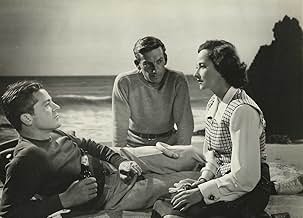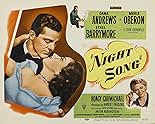अपनी भाषा में प्लॉट जोड़ेंWhen a beautiful socialite falls in love with an embittered composer who is blind, she feigns blindness herself in order to get closer to him.When a beautiful socialite falls in love with an embittered composer who is blind, she feigns blindness herself in order to get closer to him.When a beautiful socialite falls in love with an embittered composer who is blind, she feigns blindness herself in order to get closer to him.
- पुरस्कार
- कुल 4 जीत
Whit Bissell
- Party Guest
- (बिना क्रेडिट के)
Leonard Bremen
- Chez Mamie Headwaiter
- (बिना क्रेडिट के)
Charles Cirillo
- Sailor at Chez Mamie
- (बिना क्रेडिट के)
Angela Clarke
- Woman
- (बिना क्रेडिट के)
George Cooper
- Bellboy
- (बिना क्रेडिट के)
Lynn Craft
- Party Guest
- (बिना क्रेडिट के)
Suzi Crandall
- Fur-Coated Pedestrian
- (बिना क्रेडिट के)
Herbert Evans
- Butler
- (बिना क्रेडिट के)
फ़ीचर्ड समीक्षाएं
They used to show it on Turner Classic Movies on Ethel Barrymore's birthday (when they would show all of her movies). It contains a wonderful original mini-concerto by film composer, Leith Stevens, written just for this film. I think this movie is wonderful, in part, because it really exemplifies the best sort of films that glamorize classical music and not only give the film-goer a glimpse into the life and excitement of being a musician, but a peak into the collaborative creative process, itself. Many of these films were made in the '30s, '40s and '50s. They are rarely made now; usually films about musicians, especially about classical musicians, alienate the audience from the artists rather than inspiring empathy and a desire to emulate the stars on screen. Also, such clever and moving plots in love stories are fairly rare now. Ironically, it has wonderful scenes where Hoagy Carmichael takes dictation for the blind composer but in real life, Hoagy Carmichael, one of the great jazz musicians of the 20th Century, could not read music. I wonder if the plot was inspired at all by the fate of the '20s Jazz Great, Bix Beiderbeck, who drank himself to death at a young age because he found it increasingly hard to get work in the Paul Whiteman-inspired era of big bands who played from written parts. It also has some wonderful quotable one-liners and great, even profound dialogue, I wish it were available. That a film with such a star-studded line-up should be completely out of print is astounding: Dana Andrews, Merle Oberon, Hoagy Carmichael, Ethel Barrymore, the great pianist, Arthur Rubenstein (who even has a couple of lines), the great Conductor, Eugene Ormandy, and the New York Philharmonic, as it was at its peak at the end of the '40s. There is a lot that is original in this film. For example, The scene in which Dana Andrews gives Merle Oberon a piano lesson is an amazing look at what brilliant interpretation based on musical maturity and advanced education can accomplish. Merle Oberon plays Chopin perfectly but mechanically, and then Dana Andrews plays it perfectly but brings it to life. We hear it from the kitchen along with Carmichael and Barrymore. She tells him archly that she doubts there is much he could teach her, as we hear it the first time together with them, and the second time, he tells her, matching her archness, exactly, "looks like she is improving already." One can neither rent nor buy Night Song. I wonder if it was issued on VHS. I just saw that a 16 mm copy went at auction for several hundred dollars on E-Bay. Pity.
10whpratt1
This was a very outstanding film for viewers who loved Merle Oberon, Dana Andrews, Ethel Barrymore and Hoagy Carmichael during the height of their careers in 1948. In this film, Cathy,(Merle Oberon),"The Broken Melody",'34, a rich woman who falls deeply in love with Dana Andrews,(Dan),"The Best Years of Our Lives",'46, who is blind and is a down and out piano player and composer. Dan has a great pal who is also a musician and they work and live together in a Jazz club and try to make ends meet. Dan's buddy is Hoagy Carmichael,(Chick),"To Have & Have Not",'44 who gives a great supporting role and is quite funny through out the entire picture. There is plenty of Classical music and a great appearance of a famous conductor and pianist. The is lots of romance, drama and comedy and a very unusual ending.
Bearing more than a distant resemblance with "magnificent obsession" ,Stahl's tear jerker of the thirties (remade by Douglas Sirk in the fifties )"Night Song " is less melodramatic ,but ,mainly in its second part ,drags on a little bit;the movie features two real life musicians :Arthur Rubinstein in the flesh ,and Hoagy Carmichael whose songs were covered even by Beatle George Harrison ("Baltimore Oriole"," Hong Hong Blues) and his influence shows in McCartney's song "baby's request" .
Dana Andrews is reliable as ever ,and Madame Barrymore provides good support (dig the line when she tells her niece that all she wants is peace);Merle Oberon's playing is a bit emotionally remote ;the music is omnipresent ,classical stuff or Carmichael's "monkey song" .But the story itself is a bit derivative.
Dana Andrews is reliable as ever ,and Madame Barrymore provides good support (dig the line when she tells her niece that all she wants is peace);Merle Oberon's playing is a bit emotionally remote ;the music is omnipresent ,classical stuff or Carmichael's "monkey song" .But the story itself is a bit derivative.
For those who did not live in the 40s, this film may appear to be soap-operish. However, one must remember that 60 years of Real and TV soap opera have drastically diminished its impact, leaving us with a feeling that we have seen it all before - forgetting that it was the "first". A blind musician, a wealthy socialite, an "all-knowing" aunt, a musical friend, Rubinstein and Ormandy - what a confection! And the "glue" that holds it all together is the music. After all, it IS "Night Song". Other reviewers have been rather harsh in their criticism of Leith Stevens' concerto. It should be noted that it has been recorded along with other film piano concertos on ELAN CD (Piano in Hollywood)and represents - along with the output of so many others - the greatest "American" symphonic music of the 20th century. Film music never gets its proper due. Whatever "romanticism" in this movie appears far fetched, it's no less plausible than the current crop of "action" films. For those who prefer clanging and banging, this "song" is not for you!
NIGHT SONG might only appear to be a routine example of the kind of postwar romance that most of the major studios produced. A blind bar pianist (Dana Andrews) is taken up by a wealthy socialite (Merle Oberon), who pretends to be blind herself in order to secure his confidence. After a courtship in San Francisco, the pianist is given sufficient financial backing to have an operation to restore his sight, and receive a concert premiere of his new concerto at Carnegie Hall, New York. He returns to San Francisco, where he meets his beloved, and the two them vow eternal love.
Frank Renton and Dick Irving Hyland's screenplay contains its fair share of intertexts. The idea of a concert performance dates back to Brian Desmond Hurst's huge British wartime hit DANGEROUS MOONLIGHT (1941), that contained the premiere of Addinsell's "Warsaw Concerto," while Andrews's predicament as a war-scarred survivor cross- references Goldwyn's THE BEST YEARS OF OUR LIVES (1946), in which the actor had given an equally memorable characterization in a similar role.
Yet nonetheless NIGHT SONG possesses a certain integrity. Director John Cromwell establishes a close bond between Andrews and his boon companion Chick (Hoagy Carmichael, who even gets a solo number), and by doing so suggests the importance of male bonding in an often uncertain world. No one, it seems, knows really what to do with the peace, after having won the war; the only outlet both men can find is playing bands in some cheap SF dive bars.
This relationship is contrasted with the more spiky friendship between Oberon and her boon companion Miss Willey (Ethel Barrymore). The grande dame of the American theater gives one of her more commanding characterizations as a supposed cynic with a heart of gold, who readily understands the agonies her younger friend experiences as she tries to woo the pianist without hurting his feelings. In an environment where people seldom gave vent to their emotions in public, emotional expression is put at a premium.
The end of the movie is enlivened by a live performance from Leopold Stokowski and Eugeme Ormandy playing themselves with the New York Philharmonic Orchestra. They do not have to do much, but they set about delivering the concerto (with music by Leith Stevens) with a conviction and gusto that is truly refreshing.
Frank Renton and Dick Irving Hyland's screenplay contains its fair share of intertexts. The idea of a concert performance dates back to Brian Desmond Hurst's huge British wartime hit DANGEROUS MOONLIGHT (1941), that contained the premiere of Addinsell's "Warsaw Concerto," while Andrews's predicament as a war-scarred survivor cross- references Goldwyn's THE BEST YEARS OF OUR LIVES (1946), in which the actor had given an equally memorable characterization in a similar role.
Yet nonetheless NIGHT SONG possesses a certain integrity. Director John Cromwell establishes a close bond between Andrews and his boon companion Chick (Hoagy Carmichael, who even gets a solo number), and by doing so suggests the importance of male bonding in an often uncertain world. No one, it seems, knows really what to do with the peace, after having won the war; the only outlet both men can find is playing bands in some cheap SF dive bars.
This relationship is contrasted with the more spiky friendship between Oberon and her boon companion Miss Willey (Ethel Barrymore). The grande dame of the American theater gives one of her more commanding characterizations as a supposed cynic with a heart of gold, who readily understands the agonies her younger friend experiences as she tries to woo the pianist without hurting his feelings. In an environment where people seldom gave vent to their emotions in public, emotional expression is put at a premium.
The end of the movie is enlivened by a live performance from Leopold Stokowski and Eugeme Ormandy playing themselves with the New York Philharmonic Orchestra. They do not have to do much, but they set about delivering the concerto (with music by Leith Stevens) with a conviction and gusto that is truly refreshing.
क्या आपको पता है
- ट्रिवियाDana Andrews wore opaque contact lenses throughout filming to give him a realistic sensation of blindness.
- गूफ़When Chick begins singing the verses on the song "Who Kill Er", you hear horn riffs playing in the background. But when it cuts to the horn players on stage, they are sitting still and not playing although you can hear the horns in the music.
- भाव
Miss Willey: My heart's an old wastepaper basket, filled with unpaid bills and paperback novels.
- कनेक्शनFeatured in Let's Go to the Movies (1949)
- साउंडट्रैकI COULDN'T SLEEP A WINK LAST NIGHT
(uncredited)
from Higher and Higher (1943)
Music by Jimmy McHugh
Performed by "Chick Morgan Band"
टॉप पसंद
रेटिंग देने के लिए साइन-इन करें और वैयक्तिकृत सुझावों के लिए वॉचलिस्ट करें
- How long is Night Song?Alexa द्वारा संचालित
विवरण
- रिलीज़ की तारीख़
- कंट्री ऑफ़ ओरिजिन
- भाषा
- इस रूप में भी जाना जाता है
- Mi corazón te guía
- फ़िल्माने की जगहें
- Broad Beach, मालिबू, कैलिफोर्निया, संयुक्त राज्य अमेरिका(aka Trancas Beach - beach scenes)
- उत्पादन कंपनियां
- IMDbPro पर और कंपनी क्रेडिट देखें
बॉक्स ऑफ़िस
- US और कनाडा में सकल
- $17,00,000
- चलने की अवधि
- 1 घं 42 मि(102 min)
- रंग
- पक्ष अनुपात
- 1.37 : 1
इस पेज में योगदान दें
किसी बदलाव का सुझाव दें या अनुपलब्ध कॉन्टेंट जोड़ें






































